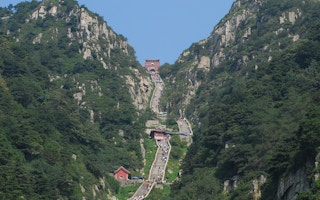The Green Climate Fund, which provides finance for developing nations to tackle climate change, said on Thursday it had reached a milestone of backing action in more than 100 countries, after approving $408 million for new projects.
At a three-day board meeting in South Korea this week, the international fund - which replenished its coffers with pledges of nearly $9.8 billion last month - agreed to allocate money to 13 projects, from water banks in thirsty northern Gaza to protecting food crops from climate threats in Mozambique.
Board co-chair Nagmeldin Goutbi Elhassan Mahmoud said fresh contributions made by 28 donor countries last month would help meet growing demand for initiatives to cut climate-warming emissions and adapt to wilder weather and rising seas.
At this week’s meeting, a further boost came from Indonesia, which pledged $500,000, doubling its first contribution.
The fund is now investing $5.6 billion in more than 100 countries worldwide.
“Developing countries’ rising ambitions, however, shows that much more can be done,” Mahmoud of Sudan said in a statement, referring to the work of the fund.
This week, several efforts to protect carbon-storing forests were greenlit in Laos, Kyrgyzstan, Chile and Paraguay, with the two Latin American nations receiving payments for reducing deforestation in earlier years.
The Churia hills region of Nepal also will receive a grant of $39 million to help nearly 1 million people respond to forest degradation, flooding and soil erosion.
China, meanwhile, had its first project approved, to set up a green development fund in eastern Shandong province. The decision came under a new majority voting procedure that overcame objections from the United States and Japan.
“
With a strong replenishment, we are well equipped to enhance developing countries’ ability to meet their Paris Agreement goals.
Yannick Glemarec, executive director, Green Climate Fund
Poorest and most vulnerable
Executive Director Yannick Glemarec said the fund had now allocated “the bulk” of its initial resources of a little over $7 billion, the amount available after the United States under President Donald Trump reneged on two-thirds of a $3 billion pledge.
“With a strong replenishment, we are well equipped to enhance developing countries’ ability to meet their Paris Agreement goals,” he said.
The Green Climate Fund was set up under U.N. climate change negotiations to help channel money needed by poor states to meet their targets to develop cleanly and adjust to a warming world.
Climate finance specialists have commended it for boosting money for under-resourced adaptation work, part of its mandate.
Niranjali Amerasinghe, executive director of ActionAid USA, said the fund now had to set its strategic direction for the next four years.
“It’s really important that… the focus is on getting the money to the poorest and most vulnerable. It’s making sure that we don’t lose sight of adaptation,” she told the Thomson Reuters Foundation as the meeting ended.
About 100 civil society groups, led by the World Rainforest Movement, said they were happy a proposal by the World Bank group’s International Finance Corporation (IFC) to subsidise a “forest bond” that would pay investors with carbon credits from business-backed forest conservation projects had been withdrawn.
It was not clear why the IFC decided to take the proposal off the table.
The fund’s board also approved an updated gender policy, though women’s rights advocates said it actually weakened the fund’s strong position on ensuring both men and women benefit from its projects in an equal way by allowing it to be implemented according to national policies and priorities.
Liane Schalatek of the Heinrich Boll Foundation North America said keeping references to human rights in the policy had been a battle.
More positively, she noted, support would now be provided to help developing countries ensure that projects backed by the fund consider gender equality and do not overlook women’s needs.
“A policy… is only as good as the implementation. It’ll be important to look at what is done,” she added.
This story was published with permission from Thomson Reuters Foundation, the charitable arm of Thomson Reuters, that covers humanitarian news, climate change, resilience, women’s rights, trafficking and property rights. Visit http://news.trust.org/climate.










